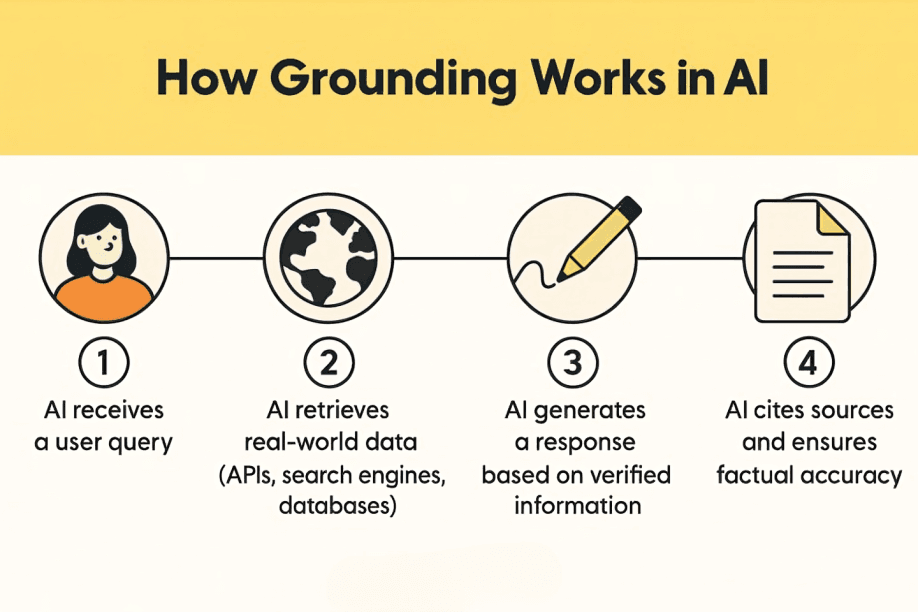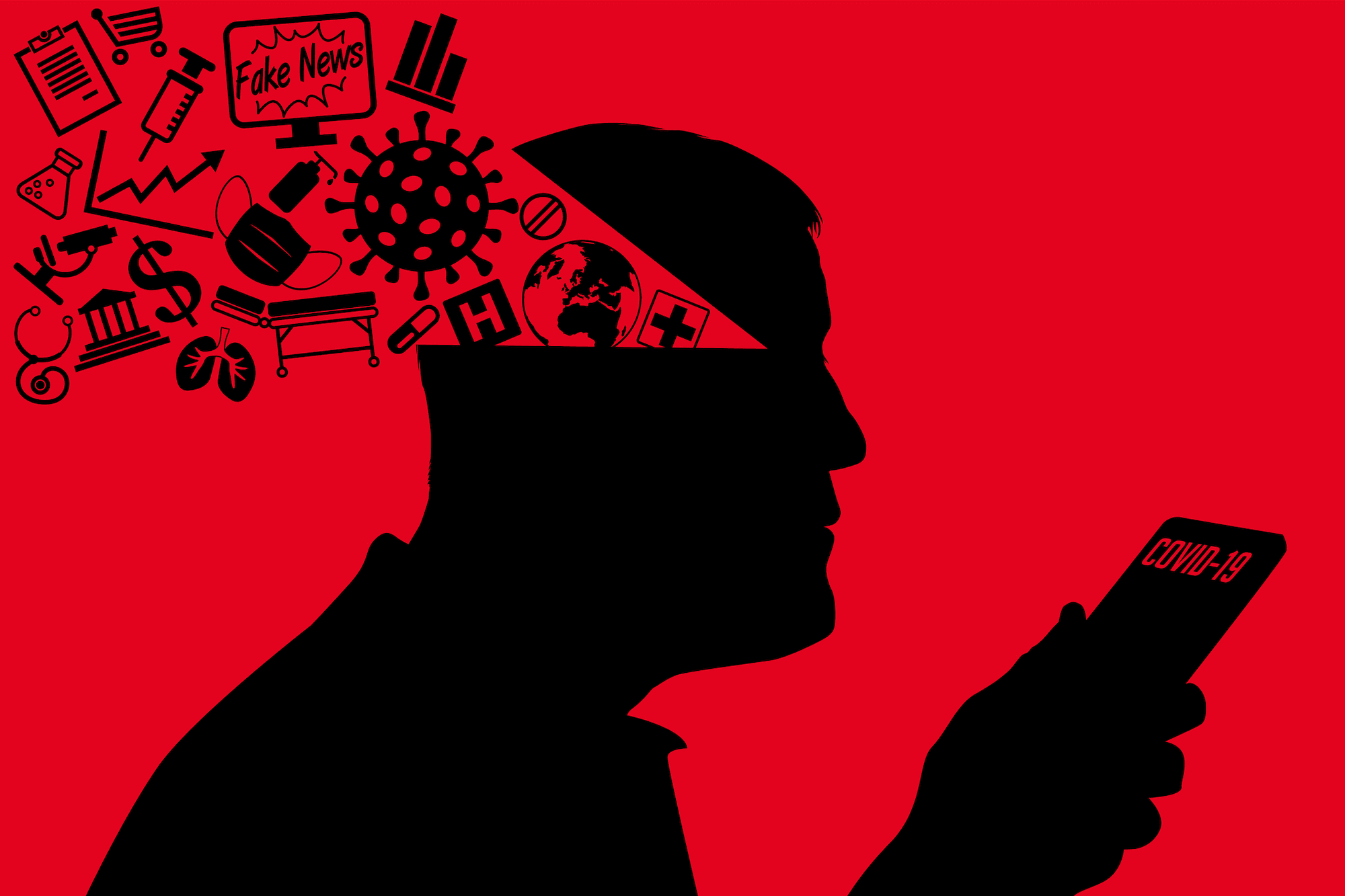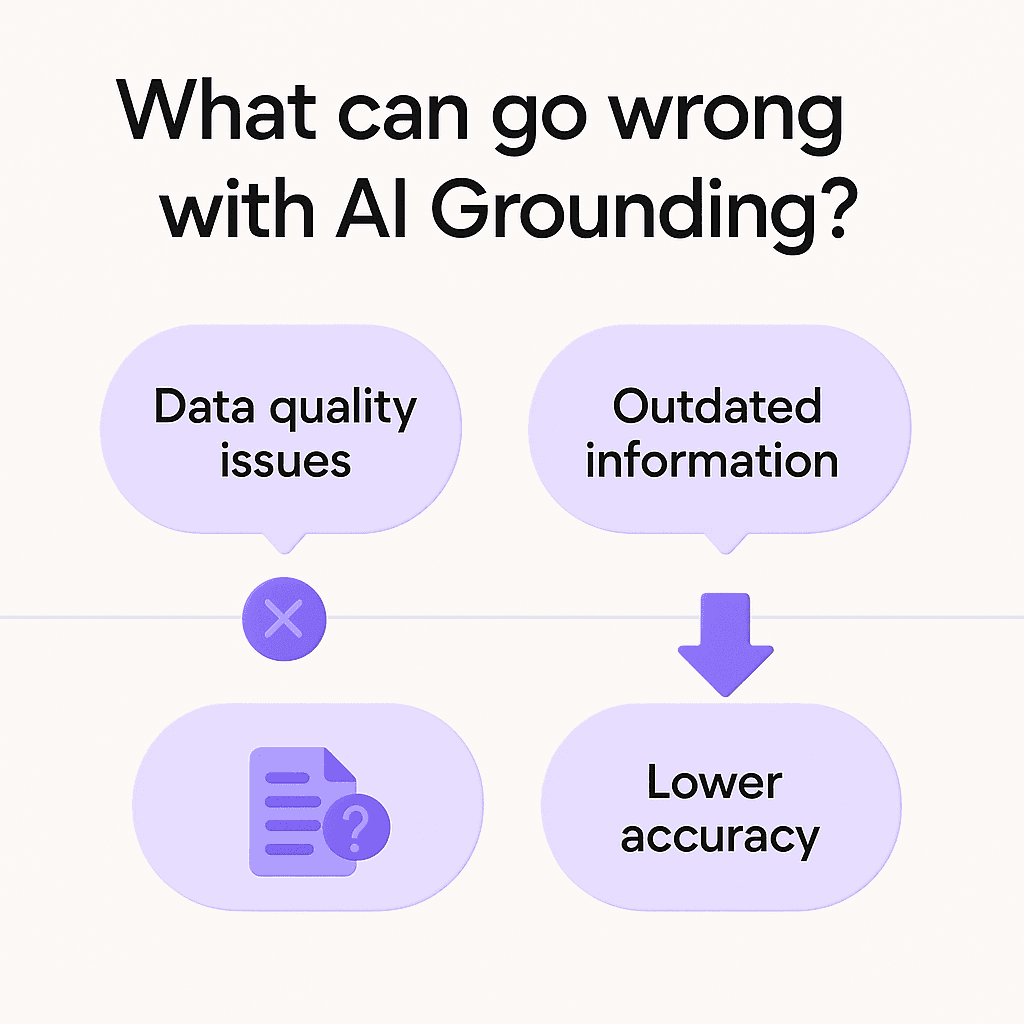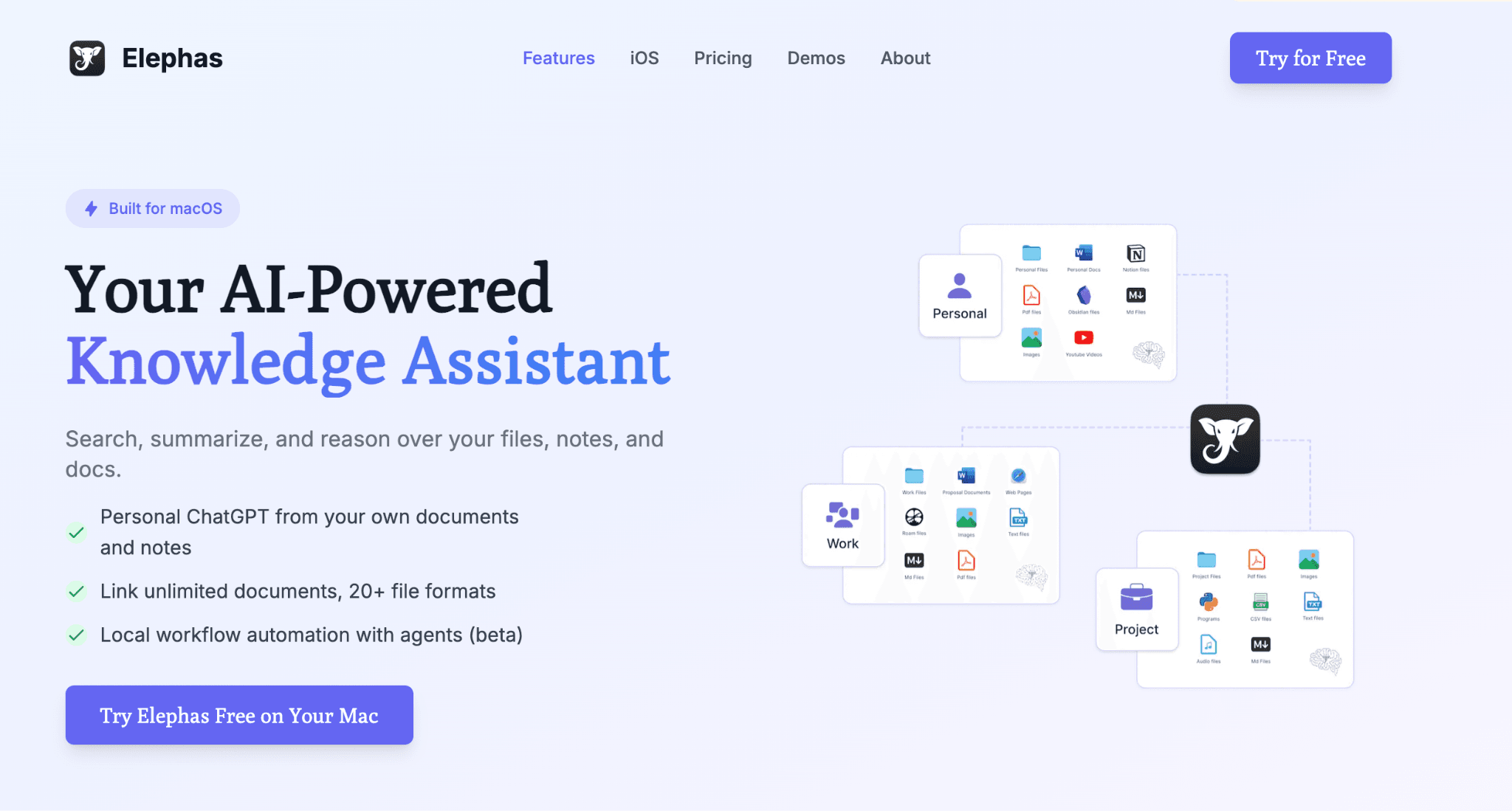AI Grounding Explained: How to Get 50% More Accurate AI Responses in 2026
Recent studies from Google Research show Enterprise applications in 2024 showed 30 to 50 percent higher accuracy with properly implemented grounding systems.
In this guide on AI grounding, we'll explore everything about AI Grounding and how we can interact with AI models like ChatGPT, Claude, and Gemini using AI Grounding.
Here is what we are going to cover:
- What is AI grounding and how it differs from regular AI
- What specific problems AI grounding solves for users
- Whether grounded AI actually performs better than standard systems
- Potential challenges and limitations you should know about
- When you should consider switching to grounded AI tools
- How to get started with grounded AI using Elephas
- Real-world benefits and practical applications
By the end of this article, you'll understand how AI grounding eliminates the guesswork from AI responses, provides verifiable source citations, and delivers significantly more accurate results for your work.
You'll also discover practical ways to implement grounded AI in your workflow, whether you're a researcher, professional, or anyone who values reliable information over convincing-sounding but potentially false AI responses.
Let's get into it.
What is AI Grounding?

AI grounding connects AI Models like ChatGPT, Claude, Gemini to real information sources instead of letting them guess answers from memory alone.
Think of regular AI as someone taking a test from what they remember, while grounded AI is like having access to books and research materials during the test.
Here's what makes it different:
- Solves the false information problem - Regular AI often creates believable but wrong answers because it relies only on old training data
- Provides fact-checking in real-time - Grounded AI looks up current information from reliable sources before responding
- Offers source verification - You can see exactly where the information came from, making answers more trustworthy
- Stays current with fresh data - Instead of using outdated training information, it accesses the latest available content
The main difference from regular AI is simple. Standard AI systems work like a person answering questions from memory, which can lead to mistakes or outdated information. Grounded AI works more like a researcher who checks reliable sources before giving you an answer. This approach dramatically reduces wrong information and provides citations you can verify yourself.
What problem does AI Grounding solve?

AI grounding tackles the biggest issue with artificial intelligence today - unreliable information. Regular AI systems often produce wrong answers because they work from memory patterns in their training data, not actual knowledge verification.
The core problems include false information creation, where AI generates convincing but incorrect responses. Research shows this happens in 3 to 27 percent of AI interactions. These systems cannot check if their generated information is true - they simply predict likely words based on statistical patterns from old training materials.
Key issues that grounding addresses:
- Eliminates guesswork responses - AI no longer relies solely on potentially outdated or incomplete training data
- Prevents believable false information - The system searches reliable sources instead of creating plausible-sounding but wrong content
- Provides verification methods - Every response includes source citations so you can check where information originated
- Reduces outdated information - Access to current databases means fresher, more accurate data
With grounding, AI responses become trustworthy because the system acts like a fact-checker. Instead of statistical guessing, it retrieves verified information from reliable sources before answering.
Will Grounded AI actually Work Better?

Grounded AI delivers significantly better performance than regular AI systems, but with some trade-offs to consider. Studies show grounded systems achieve 30 to 50 percent higher accuracy rates compared to standard AI models, especially when dealing with knowledge-based questions.
The accuracy improvement comes from real-time fact checking against verified sources. Instead of relying on potentially outdated training data, grounded AI searches current information before responding. This approach can reduce wrong information rates to nearly zero in many situations.
Performance considerations include:
- Higher accuracy rates - Responses based on verified sources instead of statistical guessing patterns
- Slightly slower response times - The system needs extra seconds to search and verify information before answering
- Competitive pricing - Many grounded AI tools cost similar to or less than premium regular AI services
- Better long-term value - More reliable answers reduce time spent fact-checking or correcting mistakes
Speed differences are usually minimal - just a few extra seconds for the system to retrieve relevant information. The slight delay is often worth the improved reliability.
Cost-wise, grounded AI tools frequently match regular premium AI pricing while delivering more trustworthy results. The investment pays off through reduced errors and increased confidence in AI responses.
What can go wrong with AI Grounding?

AI grounding improves accuracy but creates new challenges you should understand. The system becomes only as reliable as the sources it uses, which means poor quality information leads to poor quality answers.
Source-related problems can significantly impact results. If the knowledge base contains outdated, biased, or incorrect information, the AI will confidently present these e rrors as facts. The system cannot judge source quality - it simply retrieves and uses whatever information is available.
Common issues include:
- Source quality dependency - Incorrect or biased sources lead to wrong answers presented with false confidence
- Limited scope problems - If sources lack information on certain topics, the AI may give incomplete or irrelevant responses
- Over-reliance on single sources - Systems using few sources can perpetuate specific errors or viewpoints
- Technical complexity - Setting up and maintaining quality knowledge bases requires more effort than using regular AI
Grounded AI can still make mistakes, especially when interpreting complex information or when sources conflict with each other.
The system might also struggle with topics not covered in its knowledge base, potentially defaulting to less reliable general training data. Success depends heavily on maintaining high-quality, current, and comprehensive source materials.
When should you switch to Grounded AI Tools?
Switch to grounded AI when accuracy matters more than speed in your work. If you frequently need reliable information for professional tasks, research, or decision-making, grounded systems provide better value than regular AI tools.
The change becomes worthwhile when you spend significant time fact-checking AI responses or when wrong information creates problems. Grounded AI reduces verification work and increases confidence in automated responses.
Benefits and considerations:
- Gain higher accuracy - Responses backed by verified sources instead of guesswork
- Lose some response speed - Extra seconds needed for information retrieval and verification
- Gain source citations - Clear references for fact-checking and credibility
- Lose simplicity - More complex setup and maintenance requirements
The effort involved depends on your chosen approach. Simple methods like copying information into prompts require no technical skills. Building comprehensive knowledge bases takes more initial work but provides ongoing benefits. Most modern grounded AI tools offer user-friendly interfaces that minimize technical complexity.
Consider switching if you work with specialized knowledge, need verifiable information, or currently spend time checking AI responses. The investment in setup time typically pays off through improved reliability and reduced fact-checking efforts.
How to get started using Grounded AI Right Now?

Elephas is a Mac knowledge assistant that makes grounded AI simple and accessible for everyone. With its Super Brain feature, you can create your own personal knowledge base using your documents, notes, and files.
Eephas works entirely with your data, giving you accurate answers based on information you trust. Elephas supports over 20 file formats and can run completely offline using local AI models, which means your sensitive information never leaves your computer.
The offline capability ensures privacy while maintaining full functionality without internet connection requirements. Howxever, you can also run Elephas using OpenAI, Claude, Gemini, Mistral, Deepseek, etc., using API keys.
Getting started with Elephas is straightforward and requires no technical skills:
- Easy knowledge base creation - Simply drag and drop your documents, PDFs, notes, and files into Super Brain
- Multiple content sources - Add YouTube videos, web pages, audio recordings, and images to expand your knowledge base
- Seamless integrations - Works directly with Apple Notes, Google Docs, Notion, Obsidian, and other productivity tools
- Instant answers - Ask questions and get responses based on your personal knowledge collection
- System-wide access - Use Super Command to access your knowledge base from any Mac application
- Automatic updates - Your knowledge base stays current as source documents change
The process is simple: create your Super Brain, add your content, then start asking questions. Elephas searches through your knowledge base and provides accurate answers with source citations, making it easy to verify information and maintain trust in AI responses.
Conclusion
AI grounding represents a genuine breakthrough in making artificial intelligence more reliable and useful in our daily work. Rather than letting AI systems make educated guesses from outdated training data, grounding connects them to real, current information sources that deliver accurate responses you can actually trust.
This approach directly tackles the persistent problem of AI creating convincing but completely wrong answers. While grounded systems might take a moment longer to respond, the significant jump in accuracy makes this small delay worthwhile for anyone doing serious work or research. Studies consistently demonstrate 30 to 50 percent better accuracy compared to standard AI tools.
The real value comes from eliminating guesswork, providing source citations you can verify, and accessing fresh information instead of stale training materials. For Mac users ready to experience truly reliable AI assistance, Elephas offers an excellent starting point with its Super Brain feature, supporting numerous file formats while keeping your sensitive data completely private through offline functionality.

Comments
Your comment has been submitted